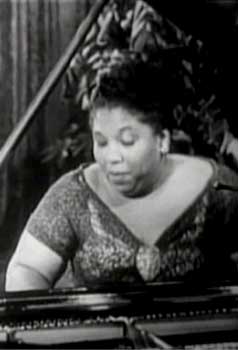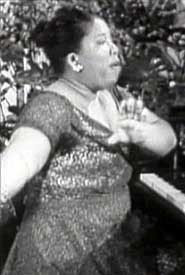 Among hard-core boogie-woogie enthusiasts, Martha Davis has remained well enough known, but to the general music-lovin' public she has been long forgotten. Her chief fame was with her contemporary black audience, who well knew her from Chicago jazz clubs days.
Among hard-core boogie-woogie enthusiasts, Martha Davis has remained well enough known, but to the general music-lovin' public she has been long forgotten. Her chief fame was with her contemporary black audience, who well knew her from Chicago jazz clubs days.
Pianists commonly had "battles" to impress one another, as well as jam sessions, & Martha was a regular participant in these.
At one all-night jam in 1939, the music stopped long enough for her to get married to Mississippi bass player Calvin Ponder, with Chicago jazz regulars as their attending family.
Calvin was part of the Earl Hines Orchestra for many years. But in 1948 he & Martha put together their own two-person act in which she was decidedly the star of the two.
Their home base had become Los Angeles, where they recorded with producer Ben Pollack's Jewel Records, & hit the R & B charts. Around this time, too, Martha worked with her fellow jump-jazz pal Louis Jordan with several cuts recorded for Decca.
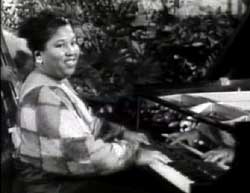 Martha has additionally been noted for decades among the hardest-core retro rock 'n' role collectors as a true pioneer of roots-rock, the reason for which is most obvious with Martha's Boogie (1951).
Martha has additionally been noted for decades among the hardest-core retro rock 'n' role collectors as a true pioneer of roots-rock, the reason for which is most obvious with Martha's Boogie (1951).
The jump-jazz or jump-blues tradition of Louis Jordan & Fats Waller just as much belonged to Martha, & is the true link that connects rhythm & blues to rock 'n' roll.
The Snader telescriptions were recorded in L.A. When they went into Lou Snader's recording studio, the act billed as "Martha Davis & Spouse" was greatly in demand for niteclubs, & they appeared on early television variety shows like the Garry Moore Show & the Steve Allen Show.
For reasons unknown they did not record much during the '50s & the Snaders are their most important material after the '40s, until 1958 when they finally cut two long-playing records. Alas not long after Martha became ill. She died of cancer in Mount Vernon, New York, in 1960. Calvin died a decade later at their Los Angeles home.
Martha at her piano for Martha's Boogie, wearing a big checkerboard-patterned dress & with her slim husband on slap bass nearby, do a rousing if fairly standard boogie-woogie number.
Watch the speed of her right hand. She does a couple stride moves unique to her take on the basic boogie, which takes a bit from Fats Waller, with whom she was chums in the 1930s.
Throughout, her husband pounds away excitedly on the bass with even a bit of a solo. They are performing on a sound stage set with enough plants to make it look like an atrium.
The original short-film version of this Snader telescription is not the version in circulation. It had been edited into then excerpted from Showtime at the Apollo: Beale Street Revue (1955). This half-hour compilation is tricked out as a fake concert at the Apollo Theater.
Included are 1951 Snaders by Cab Calloway (two of Cab's) & one by Herb Jeffries, & Studio telescriptions filmed on Manhattan at Studio Productiosn in 1954 of the Larks, Sarah Vaughn, & Amos Milburn. It's fudged to look like a single night of performances with connecting bits by comic Nipsy Russell & host Willie Bryant.
The circulating version has a couple of jump-cut insertions, first to an audience which may or may not be at the Apollo Theater but has nothing whatsoever to do with this recording, then to Willie Bryant host of the television series into which these telescriptions were incorporated.
There are a few like interuptions in some of the other telescriptions, but when Martha did her live performance the only audience was the production crew.
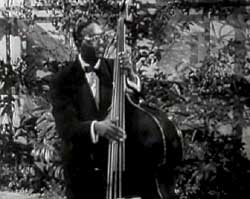 We Just Couldn't Say Goodbye (1951) she sings more or less as a straight swing song rather than jump jazz. Although the comedic bent of much jump-jazz is evident in the lyrics, Martha's nonetheless decided not to give it a humorous interpretation. It's a straight-on love song:
We Just Couldn't Say Goodbye (1951) she sings more or less as a straight swing song rather than jump jazz. Although the comedic bent of much jump-jazz is evident in the lyrics, Martha's nonetheless decided not to give it a humorous interpretation. It's a straight-on love song:
"Well I thought that love was over & we were really through/ I said I didn't love him, that we'd begin anew/ And you can all believe me, we sure intended to/ But we just couldn't say good-bye.
"Wellll the chair & then the sofa, they broke down & cried/ The curtains began wavin' for me to come inside/ I tell you confidentially the tears were hard to hide/ But we just couldn't say good-bye.
"The clock was striking twelve o'clock/ Smiled on us below/ With folded hands it seemed to say/ I'll miss you when you go./
"So I went back & kissed him, & when I looked around/ The room was making love songs & jumping up & down/ And now we are so happy because at last we found/ We just couldn't say goodbye."
This had been a hit for both the Guy Lumbardo orchestra & Paul Whiteman band in 1932 & became an often-covered standard, from Frank Sinatra, Frankie Laine, the Boswell Sisters, the Andrew Sisters...
The composer was Harry M. Woods who began in the Roaring '20s writing an astonishing number of songs the world would never forget: "When the Red Red Robbin Comes Bob Bob Bobbin Along," "Side by Side," "Paddlin' Madelin Home," "I'm Looking Over a Four Leaf Clover," "Try a Little Tenderness," & so many others. You'll find cuts with his name attached from such greats as Paul Robeson, Billie Holiday & Fats Waller.
Martha singing it in this telescription got spliced into the half-hour program Showtime at the Apollo: All Star Revue (1955). Other Snader inclusions were by the King Cole Trio (Route 66, 1951), Sarah Vaughan (You're Not the Kind of Boy for Me, 1952) & Lionell Hampton (Ding Dong Baby & Slide, Hamp, Slide, 1951), plus Studio telescriptions from the Larks (Danny Boy, 1954) & Jimmy Brown (My Love Is True, 1954). The Studio Productions additions included comedy by Mantan Moreland & Nipsy Russell as well as host Willie Bryant.
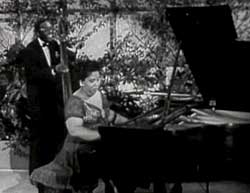 Because the Jordanesque rapping lyrics of Vipity Vop; aka, Vip-i-ty Vip-i-ty Vop (1951) are so strangely cool I'm going to transcribe the whole thing: "A vipity vipity vop/ A vividy vividy vop/ A vividy vividy vividy vop/ A vop vop -- uhm.
Because the Jordanesque rapping lyrics of Vipity Vop; aka, Vip-i-ty Vip-i-ty Vop (1951) are so strangely cool I'm going to transcribe the whole thing: "A vipity vipity vop/ A vividy vividy vop/ A vividy vividy vividy vop/ A vop vop -- uhm.
"Second verse, a little worse: Now Nelly Lou, she turned up her nose/ She said, I can do that with my eyes closed/ You can catch up on this jive, that's what i'm just about getting ready to put out/ Now she says, look out boys, we're gonna do this & that/ Then all of a sudden we heard a crack/ And poor old Nelly she fell on her back.
"So we picked her up, gave her a little alcohol/ And put her in a chair, propped her up against the wall/ She went vipity vipity vop/ A vividy vividy vop/ A vividy vividy vop/ A vop-vop -- uhm.
"Third verse, almost like the first: Now Suzy Jane she was fat & sassy/ She had too much to drink & her eyes were glassy/ She stumbled out & she started to faint/ And then she did a pretty good job of doing the shake.
"Well she went over the top & did a broken wing/ And she did the highland fling/ And the lindy hop & all those things/ And just when everyone started hollerling for more/ Poor Suzy slipped & fell on the floor.
"She went vipity vipity vop/ Vividy vividy vop/ A vividiy vividy vop/ Vop vop -- instrumental solo!"
After a boogin' instrumental with some left-hand "walkin'" along the keys, she does the final rap-rhyme verse:
"Now Sefronia Bee, she let out a roar/ She said lock the windas & lock the doors/ There ain't a gal around for miles who can put out what I'm getting ready to put out/ And I bet their ain't a man alive who can pick up on this real mellow jive/ Ahh, that ain't what puzzled me/ I wondered how she picked up on that energy.
"Well. Folks, I gotta make it clear/ We had to pull her down from the chandaleer/ She went vipity vipity vop/ A vividy vividy vop/ A vividy vividy vop vop/ Vop-vop, one more time/ She went vividy vividy vop/ A vividity vividy vop/ A vop-vop."
With this number we get a pure piece of jump-jazz Martha style, with all the up-tempo excitement & laughing beat you'd expect from a Louis Jordan, who all but invented rap with such numbers as "Beware!"
It was incorporated into the half-hour televised "concert" Showtime at the Apollo: Showtime in Harlem (1955), together with other Snader telescriptions recorded by the Nat "King" Cole Trio (You Call it Madness, 195-), the Delta Rhythm Boys (Take the A Train, 1951) & Lionell Hampton (Beulah's Boogie, 1951; & Midnight Sun, 1951), plus new material spliced in by Mantan, Nipsy, & Willie trying hard to make it look like a live night at the Apollo.
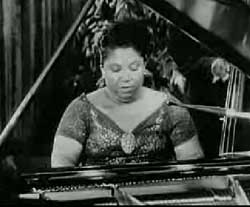 For Goodbye; aka, Just Goodbye (1951), Martha's boogyin' solo on the piano is great, pure jump-jazz throughout, & together with Vipity Vop we have the best examples of her comedic manner joined with great performing skill. For Goodbye; aka, Just Goodbye (1951), Martha's boogyin' solo on the piano is great, pure jump-jazz throughout, & together with Vipity Vop we have the best examples of her comedic manner joined with great performing skill.
This is a tough song: "Well, mister you've had your last chance/ And this sister's through with your romance/ There's no need to even ask why/ I've just one thing to say & that's goodbye," & the lyrics just gets meaner & meaner, thus funnier & funnier, as it progresses.
Fats Waller can be heard just a little here & there in the piano strokes, & certainly the lyrics, with bits like "Looky here honey, drop dead," has Waller attitude.
This one was incorporated into the half-hour Showtime at the Apollo: Stars Over Harlem (1955) with additional Snaders sewn in, by Count Basie (two telescriptions), the King Cole Trio, & Delta Rhythm Boys; & Studio telescriptions by Big Joe Turner & Ruth Brown, plus the antics of Nipsy, Mantan, & Willie.
Much more material was added for a feature-length theatrical release version, Rhythm & Blues Review (1955). Martha's telescriptions are collected together as part of the dvd compilation Swing Era: Dinah Washington (2006), a misnomer of a title since it features many female jazz vocalists from soundies & telescriptions.
copyright © by Paghat the Ratgirl
|
